FTC disclaimer. This post may contains affiliate links, and I will be compensated if you purchase through one of my links.
Discover powerful acceptance quotes that challenge conventional thinking and reveal the path to genuine inner freedom and wholeness.
When You Feel Like You’re Not Enough
We all feel like something’s missing. That empty feeling makes us chase more—more success, more stuff, more praise. We think the next thing will finally make us feel okay.
But here’s the truth: most of what you think about yourself isn’t even yours.
Your parents told you one thing. The school told you another. Social media tells you something else.
You’ve spent years trying to be what they said you should be.
And those people you compare yourself to? They’re doing the same thing. They feel just as empty as you from within.
The real message is this: you were born whole. Nothing is broken. You just fail to realise.
The Truth Nobody Talks About
When you beg others to respect you, you lose your dignity. Real self-respect doesn’t come from pleasing people or performing for them. It comes from knowing your value.
Stop looking outside for approval. The moment you do, you take back what was always yours. Dignity isn’t something people give you. It’s something you remember.
Finding Your Way Back Home
Self-acceptance doesn’t come from repeating inspiring words to yourself. It comes from seeing things clearly.
Watch your thoughts. Notice where your beliefs came from. See the endless chatter in your mind. When you do this honestly, something changes.
You’re not accepting a broken version of yourself. You’re seeing that there was never anything wrong to begin with.
Clarity ends the lie of ‘not being enough’.
Also Read: 40 Relatable Social Anxiety Quotes and Sayings To Heal
Acceptance Quotes on Self and Personal Growth
You can’t grow if you’re hiding from yourself. These quotes are about accepting who you really are—the messy parts, the mistakes, all of it.
They show why chasing perfection exhausts you. Real change starts when you stop running from yourself and work with what’s actually there.
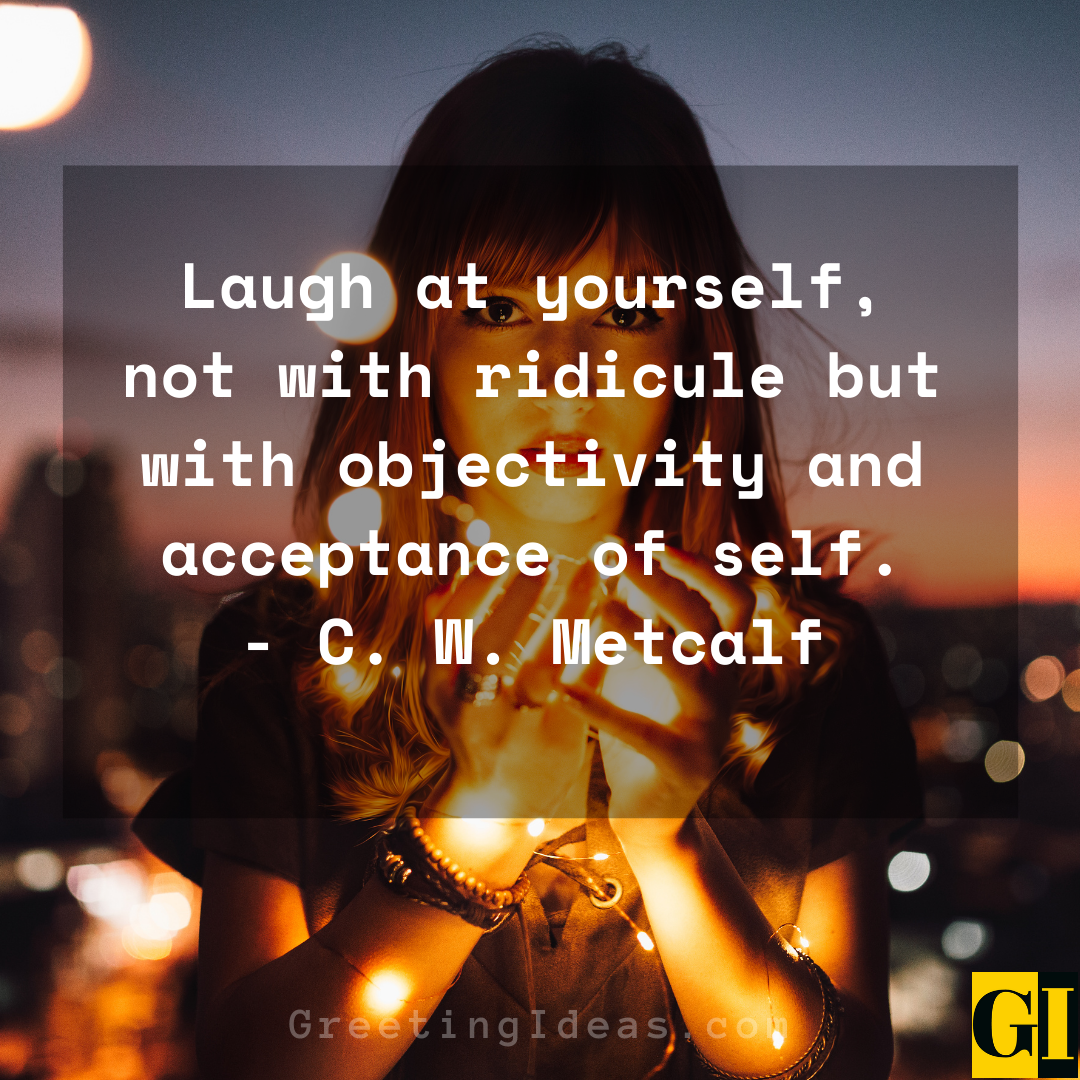 Also Read: 80 Key to Being Happy Quotes and Sayings with Yourself
Also Read: 80 Key to Being Happy Quotes and Sayings with Yourself
The curious paradox is that when I accept myself just as I am, then I can change. — Carl Rogers, American psychologist and humanistic psychology founder
This reveals that self-improvement paradoxically requires first accepting our current reality completely.
Carl Rogers (1902-1987) was an American psychologist who pioneered person-centered therapy, emphasizing unconditional positive regard, empathy, and genuineness as essential therapeutic conditions that facilitate personal growth.
To be yourself in a world that is constantly trying to make you something else is the greatest accomplishment. — Ralph Waldo Emerson, American essayist and philosopher
Emerson honors the courage required to maintain authenticity amid relentless social pressure to conform.
Ralph Waldo Emerson (1803-1882) was an American essayist, lecturer, and poet who led the transcendentalist movement, emphasizing individualism, nature, and the inherent goodness of people and nature.
You yourself, as much as anybody in the entire universe, deserve your love and affection. — Buddha, spiritual teacher and founder of Buddhism
Buddha reminds us that self-compassion isn’t selfish—it’s a fundamental human right we often deny ourselves.
Siddhartha Gautama (c. 563-483 BCE), known as the Buddha, was a spiritual teacher whose teachings on suffering, living, and compassion founded Buddhism and influenced millions across centuries and cultures.
Owning our story and loving ourselves through that process is the bravest thing we’ll ever do. — Brené Brown, research professor and author
Brown identifies vulnerability and self-acceptance as acts of courage rather than weakness or resignation.
Brené Brown (1965-present) is an American research professor, author, and public speaker whose work on vulnerability, shame, and courage has transformed how millions approach authenticity and wholehearted living.
Be yourself; everyone else is already taken. — Oscar Wilde, Irish poet and playwright
Wilde’s witty observation cuts to the futility of trying to be anyone other than ourselves.
Oscar Wilde (1854-1900) was an Irish poet, playwright, and wit known for his clever epigrams, the novel The Picture of Dorian Gray, and plays that celebrate paradox and aesthetic beauty.
Self-acceptance is my refusal to be in an adversarial relationship with myself. — Nathaniel Branden, Canadian-American psychotherapist
Branden frames self-acceptance as choosing peace over internal warfare and self-criticism.
Nathaniel Branden (1930-2014) was a Canadian-American psychotherapist and writer who pioneered work on self-esteem psychology, emphasizing personal responsibility and rational self-interest in mental health.
I think the reward for conformity is that everyone likes you except yourself. — Rita Mae Brown, American writer and activist
Brown exposes the devastating cost of abandoning authenticity for social approval and external validation.
Rita Mae Brown (1944-present) is an American writer and activist known for her groundbreaking novel Rubyfruit Jungle and her work advancing LGBTQ+ rights and feminist causes.
Your problem is you’re too busy holding onto your unworthiness. — Ram Dass, American spiritual teacher
Ram Dass suggests that we actively maintain our negative self-image through habitual thought patterns.
Ram Dass (1931-2019), born Richard Alpert, was an American spiritual teacher, psychologist, and author who bridged Eastern spirituality and Western psychology, inspiring millions toward consciousness and compassion.
The privilege of a lifetime is to become who you truly are. — Carl Jung, Swiss psychiatrist and psychoanalyst
Jung presents authentic self-discovery as life’s ultimate opportunity and greatest achievement.
Carl Gustav Jung (1875-1961) was a Swiss psychiatrist who founded analytical psychology, introducing concepts like archetypes, the collective unconscious, and the process of individuation toward wholeness.
Loving yourself isn’t vanity. It’s sanity. — Katrina Mayer, author and inspirational writer
Mayer reframes self-love as psychological health rather than narcissism or self-indulgence.
Katrina Mayer is a contemporary author and inspirational writer whose accessible quotes on positivity, self-acceptance, and personal growth resonate widely on social media and in personal development circles.
You are imperfect, permanently and inevitably flawed. And you are beautiful. — Amy Bloom, American writer and psychotherapist
Bloom embraces the coexistence of imperfection and beauty, rejecting false either-or thinking.
Amy Bloom (1953-present) is an American writer and psychotherapist whose fiction and essays explore human relationships, resilience, and the complexities of love with compassion and insight.
Acceptance Quotes About Life and Reality
Life doesn’t care about your plans. Reality shows up messy, unfair, and completely different from what you imagined.
These quotes help you stop fighting what is and start dealing with it.
Because peace doesn’t come from controlling everything—it comes from accepting what you can’t control.
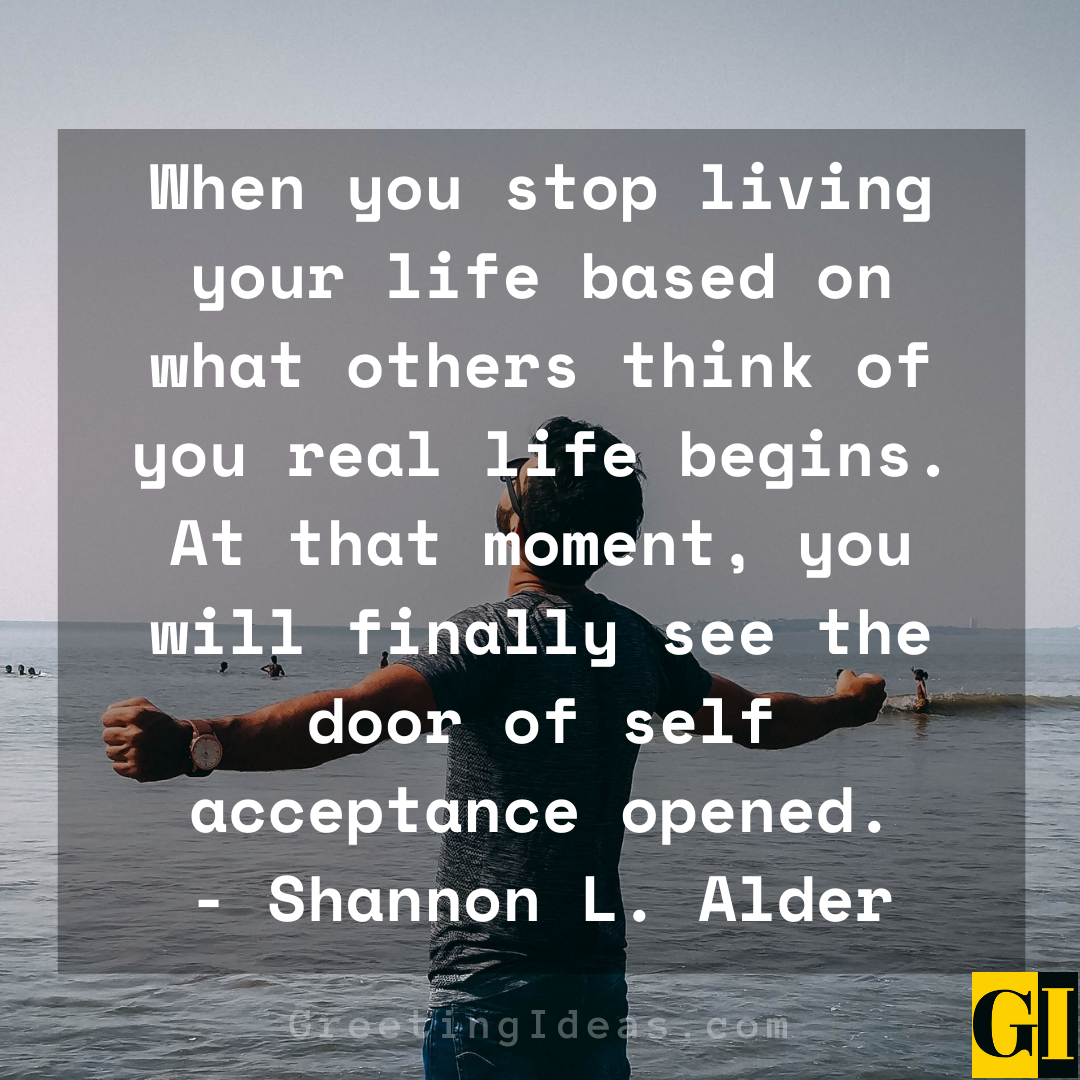 Also Read: 50 Inspiring Everyday is A New Day Quotes and Sayings
Also Read: 50 Inspiring Everyday is A New Day Quotes and Sayings
Understanding is the first step to acceptance, and only with acceptance can there be recovery. — J.K. Rowling, British author
Rowling outlines a progression from comprehension through acknowledgment toward healing and moving forward.
J.K. Rowling (1965-present) is a British author best known for the Harry Potter series, which became a global phenomenon, and for her advocacy for multiple sclerosis research and children’s welfare.
Happiness can exist only in acceptance. — George Orwell, English novelist and essayist
Orwell makes the bold claim that contentment is impossible without first embracing reality as it exists.
George Orwell (1903-1950) was an English novelist, essayist, and journalist whose works, 1984 and Animal Farm, warned against totalitarianism while championing democratic socialism and clear language.
The greatest gift you can give someone is the space to be themselves, without the threat of you leaving. — Kai, author
This quote extends beyond self-acceptance to include fully accepting others without conditional approval.
Kai is a contemporary author whose reflections on relationships, mental health, and emotional intelligence have gained wide recognition through social media and self-help communities.
Life is a series of natural and spontaneous changes. Don’t resist them; that only creates sorrow. — Lao Tzu, ancient Chinese philosopher
Lao Tzu identifies resistance to natural change as the primary source of human unhappiness.
Lao Tzu (6th century BCE) was an ancient Chinese philosopher and writer, traditionally considered the author of the Tao Te Ching and founder of philosophical Taoism, emphasizing harmony and natural flow.
Some things are up to us, and some things are not up to us. — Epictetus, Greek Stoic philosopher
Epictetus provides the foundational Stoic principle distinguishing between what we control and what we don’t.
Epictetus (c. 50-135 CE) was a Greek Stoic philosopher born into slavery whose teachings on virtue, self-control, and focusing only on what’s within our power profoundly influenced Western philosophy.
You can’t stop the waves, but you can learn to surf. — Jon Kabat-Zinn, American professor and meditation teacher
Kabat-Zinn offers a practical metaphor for working skillfully with unavoidable life challenges.
Jon Kabat-Zinn (1944-present) is an American professor emeritus of medicine who founded Mindfulness-Based Stress Reduction (MBSR), bringing Buddhist mindfulness practices into mainstream medicine and psychology.
The art of living lies less in eliminating our troubles than in growing with them. — Bernard Baruch, American financier and statesman
Baruch reframes life mastery as developing alongside difficulties rather than achieving a problem-free existence.
Bernard Baruch (1870-1965) was an American financier, philanthropist, and political consultant who advised several U.S. presidents and became known for his wisdom on economics and human nature.
Life is 10% what happens to you and 90% how you react to it. — Charles R. Swindoll, American evangelical Christian pastor
Swindoll emphasizes our power lies not in controlling events but in choosing our responses.
Charles R. Swindoll (1934-present) is an American evangelical Christian pastor, author, and radio preacher whose messages on grace, encouragement, and practical Christian living have reached millions worldwide.
We cannot change anything until we accept it. — Carl Jung, Swiss psychiatrist and psychoanalyst
Jung establishes acknowledgment as the prerequisite for any genuine transformation or healing process.
Carl Gustav Jung developed depth psychology, exploring how unconscious forces shape behavior and how integrating shadow aspects leads to psychological wholeness and maturity.
The only way to make sense out of change is to plunge into it, move with it, and join the dance. — Alan Watts, British philosopher and writer
Watts advocates enthusiastic participation in change rather than fearful observation from the sidelines.
Alan Watts (1915-1973) was a British-American philosopher who interpreted Eastern philosophy for Western audiences, making Zen Buddhism and Taoism accessible through books, lectures, and broadcasts.
Suffering is not holding you. You are holding suffering. — Buddha, spiritual teacher
Buddha shifts responsibility, suggesting we maintain our pain through attachment rather than being victimized by circumstances.
Siddhartha Gautama taught that craving and aversion cause suffering, and that liberation comes through letting go of attachment while developing wisdom, ethics, and meditative awareness.
Also Read: 50 Famous Positive Uplifting Quotes for Difficult Times
Deep Acceptance: Embracing the Shadow Self
The parts of yourself you reject don’t go away. They hide and control you without you knowing.
These quotes talk about facing your whole self—even the parts you don’t like.
You can’t have real peace by pretending half of you doesn’t exist. Wholeness means accepting your darkness, too.
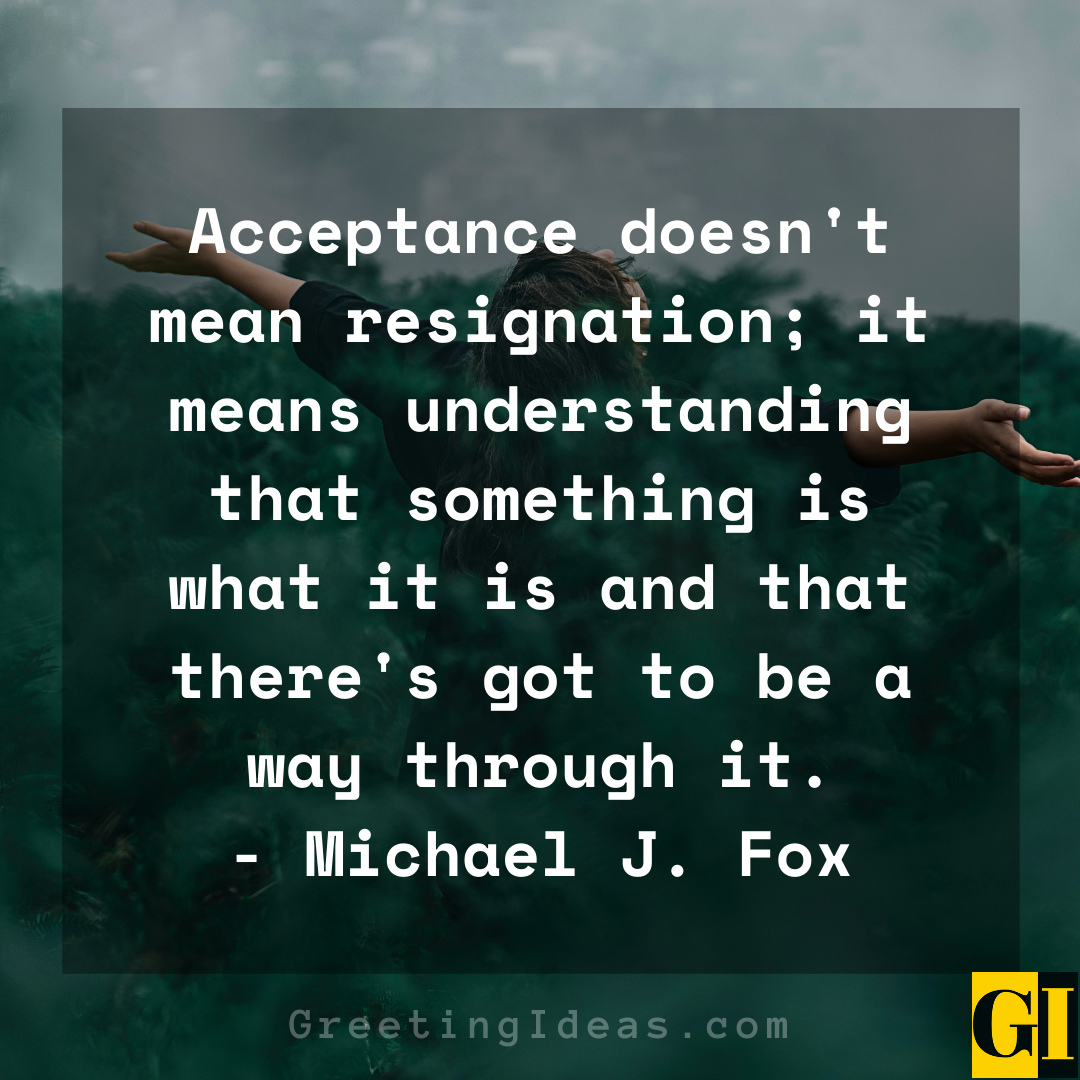 Also Read: 50 Best Inspirational Quotes and Sayings To Live Strong Life
Also Read: 50 Best Inspirational Quotes and Sayings To Live Strong Life
One does not become enlightened by imagining figures of light, but by making the darkness conscious. — Carl Jung, Swiss psychiatrist and psychoanalyst
Jung insists that spiritual growth requires facing our shadow rather than only cultivating positive qualities.
Carl Gustav Jung introduced the concept of the shadow, repressed or denied aspects of personality that remain unconscious but powerfully influence thoughts, emotions, and behaviors throughout life.
The greatest discovery of my generation is that human beings can alter their lives by altering their attitudes. — William James, American philosopher and psychologist
James highlights how perspective shifts create real changes in experience and life outcomes.
William James (1842-1910) was an American philosopher and psychologist considered the Father of American psychology, whose pragmatist philosophy emphasized practical consequences and individual experience.
What you resist persists. — Carl Jung, Swiss psychiatrist and psychoanalyst
Jung observes that fighting against aspects of ourselves or reality paradoxically strengthens their hold.
Carl Gustav Jung’s therapeutic approach emphasized confronting rather than suppressing difficult emotions, traumatic memories, and unacceptable impulses to achieve psychological integration and health.
The privilege of a lifetime is being who you are. — Joseph Campbell, American professor of literature and mythology
Campbell celebrates authentic self-expression as life’s ultimate gift and deepest purpose.
Joseph Campbell (1904-1987) was an American professor who studied comparative mythology and religion, best known for his work on the hero’s journey and encouraging people to follow their bliss.
Our entire life consists ultimately in accepting ourselves as we are. — Jean Anouilh, French dramatist
Anouilh suggests that self-acceptance isn’t one task among many—it’s life’s central undertaking.
Jean Anouilh (1910-1987) was a French dramatist whose plays explored themes of innocence, corruption, and the tension between idealism and reality in modern life.
I am not what happened to me, I am what I choose to become. — Carl Jung, Swiss psychiatrist and psychoanalyst
Jung empowers us to define ourselves through conscious choice rather than passive victimhood.
Carl Gustav Jung believed individuation—becoming one’s true self—required conscious engagement with unconscious material through dreams, active imagination, and honest self-examination.
Accept everything about yourself—I mean everything. You are you and that is the beginning and the end—no apologies, no regrets. — Clark Moustakas, American psychologist
Moustakas demands radical, complete self-acceptance without qualification, excuse, or shame.
Clark Moustakas (1923-2012) was an American psychologist who pioneered humanistic and phenomenological psychology, emphasizing authentic relationships, loneliness, and the creative self in therapeutic work.
The most terrifying thing is to accept oneself completely. — Carl Jung, Swiss psychiatrist and psychoanalyst
Jung acknowledges that genuine self-acceptance requires immense courage to face what we’ve hidden.
Carl Gustav Jung spent decades exploring his own unconscious through detailed dream journals and active imagination, modeling the difficult inner work he prescribed for patients.
Your visions will become clear only when you can look into your own heart. — Carl Jung, Swiss psychiatrist and psychoanalyst
Jung emphasizes that clarity comes from introspection and self-knowledge rather than external seeking.
Carl Gustav Jung’s concept of the Self represented the totality of conscious and unconscious aspects integrated into wholeness, the goal of psychological development.
Everything that irritates us about others can lead us to an understanding of ourselves. — Carl Jung, Swiss psychiatrist and psychoanalyst
Jung reveals how our reactions to others provide valuable information about our own unacknowledged qualities.
Carl Gustav Jung taught that projection—seeing our own traits in others—offers opportunities for self-discovery when we recognize and reclaim these disowned parts.
The curious paradox is that when I accept myself just as I am, then I can change. — Carl Rogers, American psychologist
Rogers captures how acceptance paradoxically enables transformation, while striving for change often creates stagnation.
Carl Rogers founded person-centered therapy on the principle that people possess innate self-healing capacities activated by empathic understanding and unconditional acceptance.
Also Read: 90 Famous Letting Go Of Anger Quotes For Mental Peace
Best Acceptance Quotes for Relationships
Accept people as they are, not as you want them to be. This changes everything.
These quotes show how your expectations push people away. Acceptance brings people closer.
You can accept someone’s reality and still set boundaries. You don’t have to tolerate harm to love imperfect people.
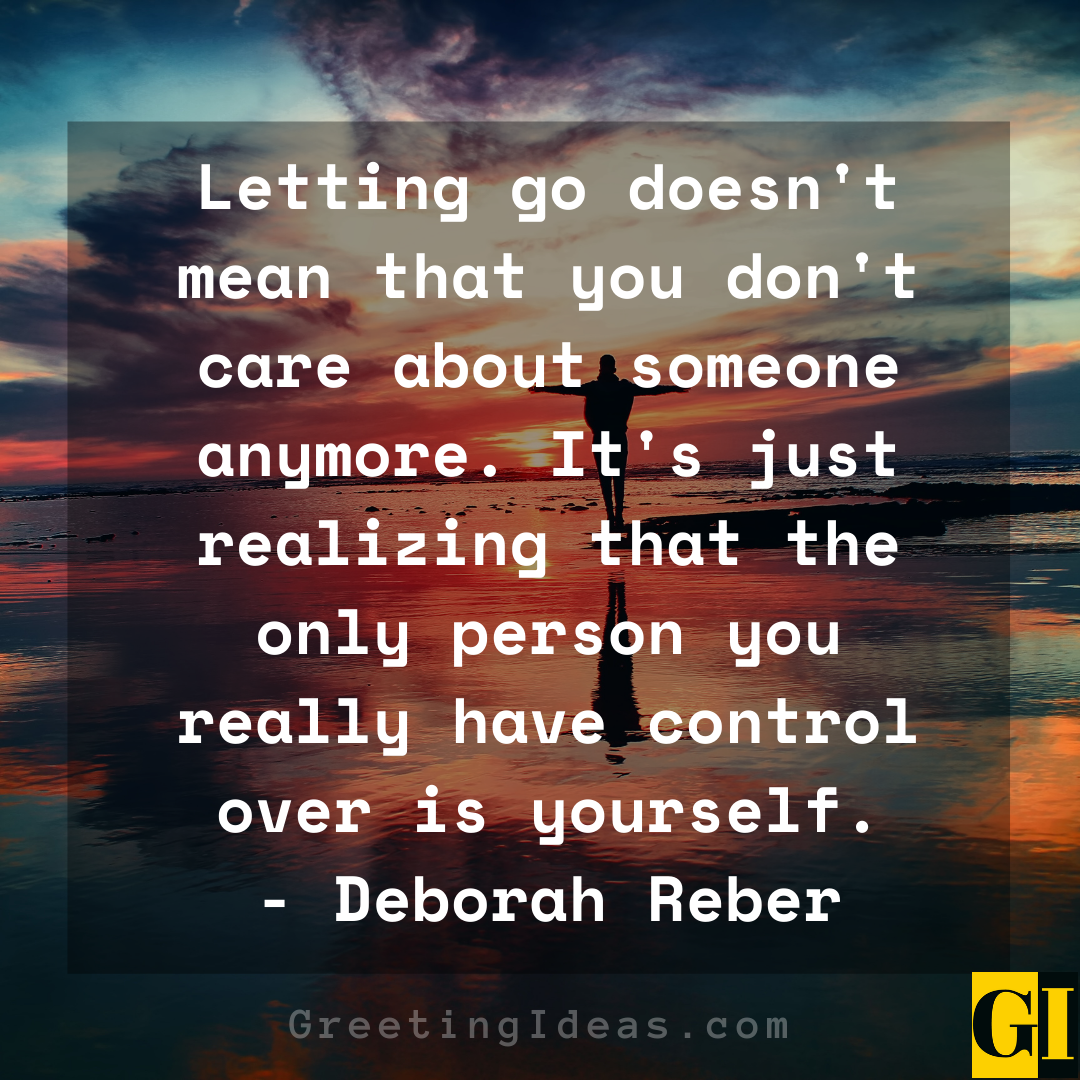 Also Read: 50 Best Inspirational Attitude Quotes and Sayings on Life
Also Read: 50 Best Inspirational Attitude Quotes and Sayings on Life
We’re all just walking each other home. — Ram Dass, American spiritual teacher
Ram Dass beautifully frames human relationships as mutual support on a shared spiritual journey.
Ram Dass taught that all beings are manifestations of one consciousness, making service to others simultaneously service to oneself and recognition of fundamental unity.
In the end, only three things matter: how much you loved, how gently you lived, and how gracefully you let go of things not meant for you. — Buddha, spiritual teacher
Buddha identifies love, kindness, and non-attachment as life’s essential qualities and measures of wisdom.
Siddhartha Gautama’s teachings on loving-kindness (metta) emphasize extending compassion to all beings without discrimination, beginning with oneself and radiating outward.
When you stop expecting people to be perfect, you can like them for who they are. — Donald Miller, American author
Miller suggests our disappointment in others stems from unrealistic expectations rather than their actual failings.
Donald Miller (1971-present) is an American author and public speaker known for memoirs exploring faith, meaning, and relationships with humor, vulnerability, and psychological insight.
Peace is the result of retraining your mind to process life as it is, rather than as you think it should be. — Wayne Dyer, American self-help author
Dyer frames peace as cognitive work—adjusting our mental processing rather than changing external circumstances.
Wayne Dyer (1940-2015) was an American self-help author and motivational speaker whose books on personal development, spirituality, and positive thinking sold millions of copies worldwide.
Acceptance doesn’t mean resignation; it means understanding that something is what it is and that there’s got to be a way through it. — Michael J. Fox, Canadian-American actor
Fox distinguishes acknowledgment from passive defeat, emphasizing that realistic assessment enables effective action.
Michael J. Fox (1961-present) is a Canadian-American actor diagnosed with Parkinson’s disease who became an advocate for research while demonstrating grace and humor, facing chronic illness.
The meeting of two personalities is like the contact of two chemical substances: if there is any reaction, both are transformed. — Carl Jung, Swiss psychiatrist and psychoanalyst
Jung describes relationships as alchemical processes that fundamentally change both participants through genuine encounter.
Carl Gustav Jung studied how intimate relationships activate unconscious projections, offering opportunities for psychological growth when partners recognize and work through these dynamics.
To accept someone as they are means to accept that they may never change—and you’re okay with that. — Unknown
This defines true acceptance as releasing the agenda for others’ transformation while maintaining connection.
Unknown authors contribute widely shared wisdom that resonates across cultures, often capturing universal truths in simple, memorable language accessible to all.
People take different roads seeking fulfillment and happiness. Just because they’re not on your road doesn’t mean they’ve gotten lost. — Dalai Lama, Tibetan spiritual leader
The Dalai Lama honors diversity in paths and values, resisting the urge to judge different choices.
Tenzin Gyatso, the 14th Dalai Lama (1935-present), is Tibet’s exiled spiritual leader and a global advocate for compassion, interfaith dialogue, and nonviolent solutions to conflict.
The greatest thing you’ll ever learn is just to love and be loved in return. — Eden Ahbez, American songwriter
Ahbez identifies mutual love as life’s supreme lesson and most profound accomplishment.
Eden Ahbez (1908-1995) was an American songwriter and recording artist known for his bohemian lifestyle and the song Nature Boy, which became a jazz standard celebrating love.
Let go of the people who dull your shine, poison your spirit, and bring you drama. Cancel your subscription to their issues. — Steve Maraboli, motivational speaker and author
Maraboli acknowledges that accepting reality sometimes means accepting that we must distance ourselves from certain relationships.
Steve Maraboli (1975-present) is an American motivational speaker and author whose empowering quotes on life, empowerment, and success circulate widely on social media platforms.
Understanding is the heartwood of well-spoken words. — Buddha, spiritual teacher
Buddha links genuine comprehension with compassionate, skillful communication that builds rather than destroys.
Siddhartha Gautama emphasized Right Speech as part of the Eightfold Path, teaching that words should be truthful, helpful, timely, gentle, and spoken with goodwill.
Also Read: 50 Self Awareness Quotes for Personal Growth & Insight
Radical Acceptance in Times of Change
Change scares us because it proves we’re not in control.
These quotes help you face transitions and losses with courage instead of denial.
Fighting change makes suffering worse. Accepting hard truths—without liking them—gives you room to respond wisely.
 Also Read: 75 Motivating Shine Bright Like a Diamond Quotes and Sayings
Also Read: 75 Motivating Shine Bright Like a Diamond Quotes and Sayings
Radical acceptance rests on letting go of the illusion of control and a willingness to notice and accept things as they are right now, without judging. — Marsha Linehan, American psychologist
Linehan defines her therapeutic concept, emphasizing acknowledgment without evaluation or approval of painful realities.
Marsha Linehan (1943-present) is an American psychologist who developed Dialectical Behavior Therapy (DBT), combining cognitive-behavioral techniques with mindfulness and acceptance strategies for emotional regulation.
The only way out is through. — Robert Frost, American poet
Frost’s simple statement acknowledges we cannot bypass difficulty—we must traverse it completely.
Robert Frost (1874-1963) was an American poet known for his realistic depictions of rural life and his command of American colloquial speech, winning four Pulitzer Prizes.
You can’t go back and change the beginning, but you can start where you are and change the ending. — C.S. Lewis, British writer and theologian
Lewis offers hope by redirecting focus from the unchangeable past to malleable future possibilities.
C.S. Lewis (1898-1963) was a British writer, theologian, and literary critic known for The Chronicles of Narnia and influential Christian apologetics exploring faith and reason.
Life is a balance of holding on and letting go. — Rumi, 13th-century Persian poet and Sufi mystic
Rumi captures the dynamic tension between commitment and release that defines skillful living.
Jalal ad-Din Muhammad Rumi (1207-1273) was a Persian poet and Sufi mystic whose ecstatic poetry on divine love, loss, and union transcends religious boundaries and cultures.
Incredible change happens in your life when you decide to take control of what you do have power over instead of craving control over what you don’t. — Steve Maraboli, motivational speaker and author
Maraboli distinguishes between productive and futile efforts, directing energy toward what we actually influence.
Steve Maraboli’s empowerment philosophy emphasizes personal responsibility, intentional living, and refusing victimhood while acknowledging legitimate pain and difficulty.
Yesterday is not ours to recover, but tomorrow is ours to win or lose. — Lyndon B. Johnson, 36th President of the United States
Johnson’s forward-looking statement emphasizes future opportunity over unchangeable history.
Lyndon B. Johnson (1908-1973) was the 36th U.S. President who advanced civil rights legislation and social programs while escalating American involvement in Vietnam.
Acceptance of what has happened is the first step to overcoming the consequences of any misfortune. — William James, American philosopher and psychologist
James establishes acknowledgment as foundational to recovery, making denial the true obstacle to healing.
William James pioneered American psychology by emphasizing empirical observation, practical consequences, and the relationship between mental states and physical experience.
Change is the only constant in life. — Heraclitus, pre-Socratic Greek philosopher
Heraclitus identifies impermanence as reality’s fundamental characteristic, making adaptation essential to thriving.
Heraclitus (c. 535-475 BCE) was a pre-Socratic Greek philosopher known for his doctrine of change being central to the universe, famously stating one cannot step in the same river twice.
When we are no longer able to change a situation, we are challenged to change ourselves. — Viktor Frankl, psychiatrist and Holocaust survivor
Frankl identifies personal transformation as the final freedom available when external circumstances resist alteration.
Viktor Frankl survived Nazi concentration camps by finding meaning in suffering, later developing logotherapy, emphasizing purpose as humanity’s primary motivational force.
The snake which cannot cast its skin has to die. — Friedrich Nietzsche, German philosopher
Nietzsche warns that refusing necessary transformation leads to stagnation and metaphorical death.
Friedrich Nietzsche (1844-1900) was a German philosopher whose provocative ideas on morality, power, and human potential challenged Western philosophical and religious traditions.
Do not dwell in the past, do not dream of the future, concentrate the mind on the present moment. — Buddha, spiritual teacher
Buddha directs attention to the only moment we can actually experience or influence—right now.
Siddhartha Gautama taught mindfulness of present-moment experience as the path to liberation from suffering caused by ruminating on the past or worrying about the future.
Social Acceptance and Belonging
We need other people. Being rejected hurts. Being accepted matters.
These quotes explore the tension: do you fit in or stand out?
They show that real belonging means showing up as yourself, not a fake version. You can stay true to yourself and still connect with others.
 Also Read: 50 Inspiring Deep Life Quotes and Sayings for a Better You
Also Read: 50 Inspiring Deep Life Quotes and Sayings for a Better You
We cultivate love when we allow our most vulnerable and powerful selves to be deeply seen and known. — Brené Brown, research professor and author
Brown identifies vulnerability—not perfection—as the gateway to authentic connection and intimacy.
Brené Brown’s research on shame and vulnerability revealed that people who feel worthy of love and belonging believe they are worthy, making self-acceptance foundational to connection.
The opposite of belonging is fitting in. Fitting in is assessing and acclimating. Belonging is being somewhere where you want to be yourself. — Brené Brown, research professor and author
Brown distinguishes genuine belonging from conformity, emphasizing authenticity as true membership’s hallmark.
Brené Brown found that true belonging requires courage to stand alone when necessary, paradoxically making authentic connection possible by first honoring one’s own values.
Be who you are and say what you feel, because those who mind don’t matter and those who matter don’t mind. — Bernard Baruch, American financier and statesman
Baruch’s widely attributed quote encourages authentic expression and helps identify genuine relationships.
Bernard Baruch served as advisor to multiple U.S. presidents, gaining a reputation for wisdom combining financial acumen with insights into human nature and social dynamics.
To be beautiful means to be yourself. You don’t need to be accepted by others. You need to accept yourself. — Thích Nhất Hạnh, Vietnamese Buddhist monk
Thích Nhất Hạnh shifts the locus of validation from external approval to internal acknowledgment and peace.
Thích Nhất Hạnh (1926-2022) was a Vietnamese Buddhist monk, peace activist, and author who popularized mindfulness in the West through his teachings on engaged Buddhism and compassionate living.
If you want to be happy, do not dwell in the past, do not worry about the future, focus on living fully in the present. — Roy T. Bennett, author
Bennett connects happiness directly to present-moment awareness rather than temporal displacement.
Roy T. Bennett is a contemporary author whose inspirational quotes on positivity, personal growth, and intentional living have gained widespread recognition through social media and self-help communities.
Your time is limited, don’t waste it living someone else’s life. — Steve Jobs, co-founder of Apple Inc.
Jobs urges authentic living aligned with personal values rather than others’ expectations or prescribed paths.
Steve Jobs (1955-2011) was an American entrepreneur and co-founder of Apple Inc. whose innovative vision revolutionized personal computing, music, phones, and digital publishing.
Fitting in is about assessing a situation and becoming who you need to be to be accepted. Belonging, on the other hand, doesn’t require us to change who we are; it requires us to be who we are. — Brené Brown, research professor and author
Brown elaborates the critical distinction between superficial acceptance and deep belonging through authenticity.
Brené Brown’s TED talk on vulnerability became one of the most viewed talks ever, resonating with millions seeking permission to show up authentically in relationships and communities.
The person who follows the crowd will usually go no further than the crowd. The person who walks alone is likely to find himself in places no one has ever been before. — Albert Einstein, theoretical physicist
Einstein celebrates independent thinking and the courage to diverge from collective opinion toward unexplored territory.
Albert Einstein faced rejection from academic institutions early in his career, later revolutionizing physics through unconventional thinking that initially challenged scientific consensus.
To be nobody but yourself in a world which is doing its best, night and day, to make you everybody else means to fight the hardest battle which any human being can fight; and never stop fighting. — E.E. Cummings, American poet
Cummings frames authenticity as a lifelong struggle against powerful conformist pressures demanding constant vigilance.
E.E. Cummings (1894-1962) was an American poet known for his experimental style, unconventional punctuation, and syntax that reflected his commitment to individual expression.
I care for myself. The more solitary, the more friendless, the more unsustained I am, the more I will respect myself. — Charlotte Brontë, English novelist
Brontë’s character asserts self-worth independent of social validation or external support systems.
Charlotte Brontë (1816-1855) was an English novelist whose Jane Eyre featured a strong, independent female protagonist who valued self-respect over social approval or romantic love.
Wanting to be someone else is a waste of the person you are. — Marilyn Monroe, American actress and model
Monroe’s quote advocates self-acceptance over envious comparison and aspirational transformation into others.
Marilyn Monroe (1926-1962) was an American actress and cultural icon who struggled with identity and acceptance despite fame, lending poignancy to her words about authenticity.
Also Read: 80 Embrace Your Inner Beauty Quotes For Self Love
Body Acceptance and Self-Image
How you feel about your body affects everything—your confidence, your happiness, your daily life.
These quotes challenge beauty standards that make you hate yourself.
Making peace with your body is hard work. It’s personal and political. You’re fighting against a culture that profits from your insecurity.
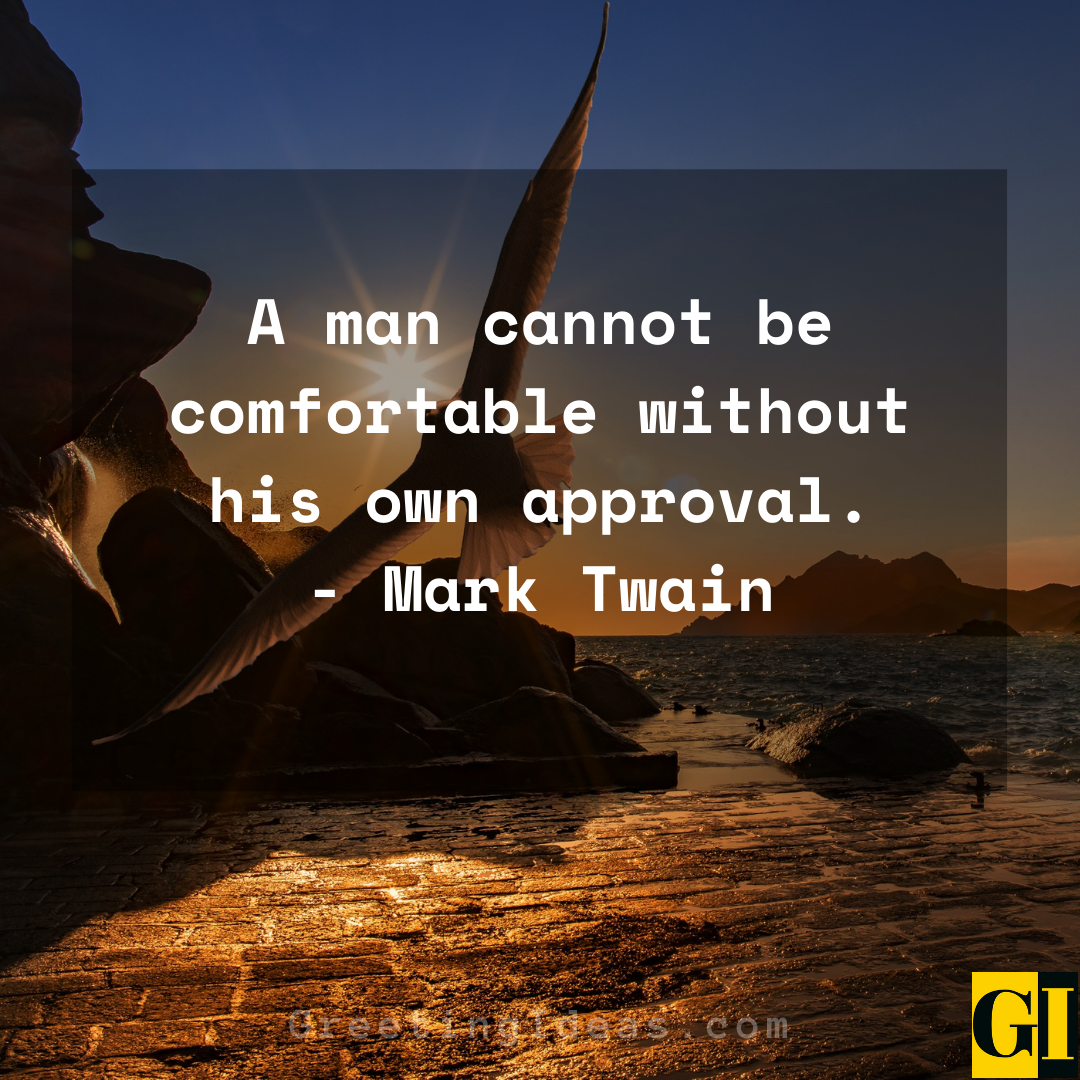 Also Read: 90 Holistic Wellness Quotes and Sayings for Mental Health
Also Read: 90 Holistic Wellness Quotes and Sayings for Mental Health
Your body is not a temple, it’s an amusement park. Enjoy the ride. — Anthony Bourdain, American chef and author
Bourdain reframes the body as a vehicle for experience and pleasure rather than a shrine requiring perfection.
Anthony Bourdain (1956-2018) was an American chef, author, and travel documentarian known for his adventurous approach to food, culture, and authentic human connection across boundaries.
You are imperfect, permanently and inevitably flawed. And you are beautiful. — Amy Bloom, American writer and psychotherapist
Bloom insists imperfection and beauty coexist naturally, rejecting conditional acceptance based on idealized standards.
Amy Bloom brings psychotherapeutic insight to her fiction and essays, exploring how people navigate loss, identity, and the messy reality of embodied life.
To lose confidence in one’s body is to lose confidence in oneself. — Simone de Beauvoir, French writer and philosopher
De Beauvoir identifies bodily acceptance as inseparable from overall self-confidence and personal power.
Simone de Beauvoir (1908-1986) was a French writer, philosopher, and feminist whose The Second Sex analyzed women’s oppression and the social construction of gender and beauty.
Your body hears everything your mind says. — Naomi Judd, American singer and motivational speaker
Judd highlights the mind-body connection, suggesting self-criticism manifests physically through stress and illness.
Naomi Judd (1946-2022) was an American country music singer who overcame significant health challenges, becoming an advocate for mental health awareness and holistic wellness.
The human body is the best picture of the human soul. — Ludwig Wittgenstein, Austrian-British philosopher
Wittgenstein suggests our physical form expresses inner reality, making body acceptance simultaneously soul acceptance.
Ludwig Wittgenstein explored how language shapes perception, arguing that philosophical problems often stem from misunderstanding language’s relationship to reality and experience.
Take care of your body. It’s the only place you have to live. — Jim Rohn, American entrepreneur and motivational speaker
Rohn emphasizes practical care for our physical form as essential infrastructure for everything else we do.
Jim Rohn (1930-2009) was an American entrepreneur, author, and motivational speaker whose philosophy emphasized personal responsibility, self-discipline, and continuous self-improvement.
Your body is your home. Treat it with love and respect. — Unknown
This simple statement frames bodily care as hospitality toward ourselves, deserving kindness, not punishment.
Unknown wisdom often captures essential truths in accessible language that transcends individual authorship, belonging to collective human experience and insight.
I’m not going to sacrifice my mental health to have the perfect body. — Demi Lovato, American singer and actress
Lovato prioritizes psychological well-being over aesthetic ideals, rejecting the destructive pursuit of physical perfection.
Demi Lovato (1992-present) is an American singer and actress who has publicly discussed struggles with eating disorders, addiction, and mental health, becoming an advocate for recovery.
Beauty is about being comfortable in your own skin. It’s about knowing and accepting who you are. — Ellen DeGeneres, American comedian and television host
DeGeneres locates true beauty in self-acceptance rather than conformity to external standards or others’ preferences.
Ellen DeGeneres (1958-present) is an American comedian and television host who courageously came out publicly in 1997, becoming an influential advocate for LGBTQ+ visibility and acceptance.
You are allowed to be both a masterpiece and a work in progress simultaneously. — Sophia Bush, American actress and activist
Bush embraces the paradox of being complete as-is while continuing to grow and develop.
Sophia Bush (1982-present) is an American actress and activist who advocates for social justice, women’s rights, and body positivity through her platform and public speaking.
My body is my journal, and my tattoos are my story. — Johnny Depp, American actor
Depp celebrates the body as a canvas for personal history, reframing marks and modifications as meaningful narrative.
Johnny Depp (1963-present) is an American actor and musician known for his eclectic film roles and distinctive personal style that challenges conventional masculine beauty standards.
Also Read: 75 Resolving Inner Conflict Quotes To Have Peace Of Mind
Expectation vs. Reality: Letting Go of Control
Most frustration comes from one place: the gap between what you think should happen and what actually happens.
These quotes show how exhausting expectations are.
They reveal how your shoulds and musts cause more pain than real life does. There’s freedom in letting them go.
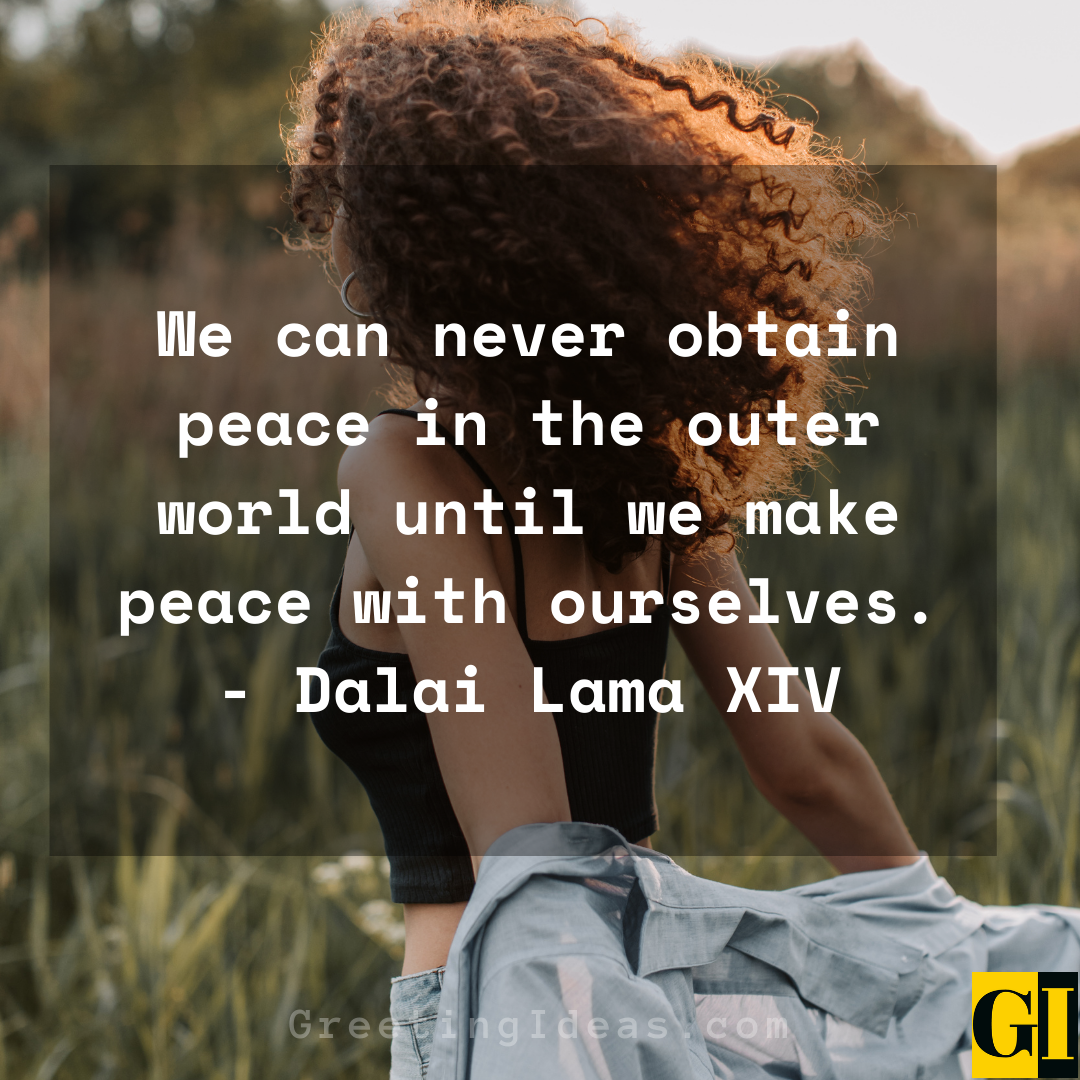 Also Read: 80 Finding True Happiness Quotes and Sayings in Life
Also Read: 80 Finding True Happiness Quotes and Sayings in Life
Expectation is the root of all heartache. — William Shakespeare, English playwright and poet
Shakespeare identifies anticipation and assumption as primary sources of emotional pain and relational discord.
William Shakespeare created complex characters whose suffering often stemmed from expectations betrayed, demonstrating timeless psychological insights through dramatic narrative.
When you let go of what you are, you become what you might be. — Lao Tzu, ancient Chinese philosopher
Lao Tzu suggests that releasing fixed identity and expectations opens possibilities previously invisible.
Lao Tzu’s teachings in the Tao Te Ching emphasize wu wei—effortless action through non-resistance—as the way to harmony with natural order.
The quality of your life is in direct proportion to the amount of uncertainty you can comfortably deal with. — Tony Robbins, American motivational speaker
Robbins links life quality to tolerance for ambiguity rather than the achievement of certainty or control.
Tony Robbins (1960-present) is an American motivational speaker, author, and life coach whose seminars and books on peak performance have influenced millions worldwide.
If you expect nothing from somebody you are never disappointed. — Sylvia Plath, American poet and novelist
Plath suggests that zero expectations eliminate disappointment, though critics note this risks disconnection.
Sylvia Plath (1932-1963) was an American poet and novelist whose confessional poetry explored depression, identity, and the constraints placed on women in mid-20th-century society.
The secret to happiness is low expectations. — Barry Schwartz, American psychologist
Schwartz’s research on the choice paradox revealed that lower expectations often lead to greater satisfaction.
Barry Schwartz (1946-present) is an American psychologist whose work on decision-making and the paradox of choice examines how excessive options and high expectations decrease happiness.
I’m not in this world to live up to your expectations, and you’re not in this world to live up to mine. — Bruce Lee, martial artist and actor
Lee establishes mutual independence from others’ standards as a foundation for authentic relationships.
Bruce Lee (1940-1973) was a martial artist, actor, and philosopher who blended Eastern and Western thought, emphasizing personal expression and adaptation over rigid systems.
Peace comes from within. Do not seek it without. — Buddha, spiritual teacher
Buddha redirects the search for peace from external arrangements to internal acceptance and understanding.
Siddhartha Gautama taught that craving for circumstances to be different from what they are creates dukkha (suffering), while acceptance brings equanimity and peace.
You can’t always control what goes on outside, but you can always control what goes on inside. — Wayne Dyer, American self-help author
Dyer delineates the boundary between external events and internal responses, locating power in the latter.
Wayne Dyer popularized the concept that thoughts create reality, emphasizing personal responsibility for mental states over victimhood regarding circumstances.
Don’t let your expectations of how something should be blind you to how it actually is. — Jon Kabat-Zinn, American professor and meditation teacher
Kabat-Zinn warns that preconceptions obscure clear seeing of present reality as it exists.
Jon Kabat-Zinn’s Mindfulness-Based Stress Reduction program trains participants to observe experience without judgment, revealing how mental commentary creates additional suffering.
Let go of certainty. The opposite isn’t uncertainty. It’s openness, curiosity and a willingness to embrace paradox. — Tony Schwartz, American journalist and author
Schwartz reframes releasing control as gaining curiosity rather than simply tolerating not-knowing.
Tony Schwartz (1952-present) is an American journalist and author whose work on energy management and sustainable performance challenges conventional productivity approaches.
The greatest weapon against stress is our ability to choose one thought over another. — William James, American philosopher and psychologist
James emphasizes cognitive choice as our primary tool for managing difficult circumstances and emotions.
William James pioneered psychological pragmatism, arguing that beliefs’ value lies in their practical consequences for well-being rather than abstract truth claims.
Also Read: 121 Best Quotes Of All Time To Inspire And Motivate You
Your Journey Toward Embracing What Is
Here’s what makes these sayings powerful—they don’t ask you to like everything or approve of circumstances that hurt.
They’re inviting you to stop exhausting yourself fighting battles you can’t win, so you have energy for the ones you can.
Real strength shows up when you acknowledge hard truths without letting them destroy you.
These words from thinkers across centuries and cultures all point to the same insight: peace doesn’t come from perfect circumstances but from making peace with imperfect ones.
Save the quotes that sting a little—they’re probably teaching something you need to hear most.
Reader Questions Answered
What are the best quotes about embracing yourself completely?
Loving yourself isn’t about feeling good all the time. Real self-love is choosing what’s truly best for you, not what’s easiest.
Many people think comfort and pleasure mean they’re being kind to themselves—but that only feeds unhealthy habits.
True self-worth comes from knowing who you really are, not from achievements or things you own.
The hard truth is that most of us built our self-image from other people’s opinions. Stop searching for approval.
Your value doesn’t come from anyone else. It has always been within you.
How do these words of wisdom help with worry and inner peace?
Your real issue isn’t anxiety—it’s stressing about the fact that you’re anxious. Don’t fight it. Let it rise and fall on its own.
Most of what you worry about exists only in your imagination, not in reality. When you see what’s imaginary clearly, it loses its power.
Anxiety fades when you’re deeply involved in something meaningful. Find something worth giving your time and energy to.
When your life has purpose, worry naturally shrinks. We’re trained to think the external world is everything, so we let it disturb our inner world.
But remember: there’s a part of you nothing can touch.
Also Read: 50 Life Is Tough Quotes To Sail Through Hard Times
What wisdom did spiritual teachers share about releasing control?
Inner peace comes from letting life flow without constantly trying to fix or control everything.
You don’t need perfect conditions to be okay. Life is unpredictable, and much of it is out of your hands—accepting this brings relief.
Even the body is temporary, and resisting that truth only makes life harder. Everything is already unfolding exactly as it should.
Let things happen instead of forcing outcomes. Surrender doesn’t mean giving up on your goals.
It means working with reality instead of exhausting yourself by fighting it.
Peace arrives when you stop demanding life follow your script.
What are powerful reminders about embracing unchangeable circumstances?
Most things aren’t in your control, even when you think they are. Random and unfair things will happen. Plans will fall apart.
The body and the world will keep changing, but inside, you can stay steady. That’s real freedom—not controlling life, but staying grounded no matter what happens.
Don’t waste energy battling the uncontrollable. If you want real change, allow something larger than you to guide you.
Your resistance to reality causes more pain than reality itself. Accept what’s in front of you, then respond wisely.
How can inspiring words improve connections with others and reduce tension?
The people around you didn’t appear by accident—you chose them in some way. If your relationships aren’t working, look at the choices you’re making.
The best relationships help you grow, not just fill emotional gaps or entertain you.
No one is worth losing your inner peace. Your contentment comes first.
You can love people as they are without accepting harm. Relationships flourish when both people keep their independence instead of clinging.
Give space. Connect out of love, not obligation.
